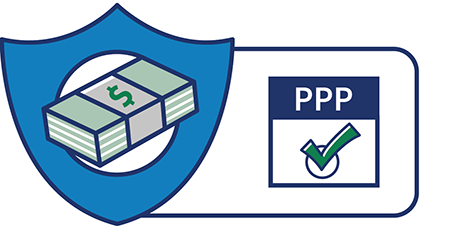- Office of Consumer Affairs and Business Regulation

Intended as a lifeline to all Americans amidst the pandemic crisis facing our nation and the world, the Coronavirus Aid, Relief, and Economic Security (CARES) Act was passed by Congress with overwhelming, bipartisan support and signed into law by the president on March 27th, 2020. The economic relief package provides more than $2 trillion for fast and direct economic assistance for workers, families, and small businesses, and preserve jobs for our nation’s industries.
The CARES Act includes important provisions to mitigate the sharp economic decline caused by the Coronavirus and established the Paycheck Protection Program (PPP). Initially funded with $350 billion, the PPP is a Small Business Administration (SBA) loan program designed to help small businesses, nonprofit organizations, veterans’ organizations, independent contractors, and other organizations cover key expenses such as payroll, rent, and utilities. Loan funds used for these purposes are eligible to be forgiven if used within a specified time frame, initially 8 weeks, and recently extended to 24 weeks. An additional $321 billion was allocated to PPP on April 27, 2020 to augment the depleted resources from the first round of funding.
According to the Division of Banks (DOB), Massachusetts chartered community banks and credit unions have already administered $4.2 billion in loans to approximately 31,000 small businesses. A DOB poll of 158 banks yielded responses from 82 institutions, 68 of which indicated that they had participated in the PPP lending program. Of the institutions that participated in Round 1 of PPP, only one did not participate in Round 2 while four participated in Round 2 but not Round 1. If additional funds become available to the PPP, 57 institutions indicated that they would continue to participate in the program. In addition, 16 institutions accessed the Federal Reserve’s PPP Liquidity Facility. And, 13 institutions stated that they had participated in other government and non-profit programs including:
- Donations to community relief funds and non-profits including meal programs and purchases.
- Donations to SBA Express and chambers of commerce.
- In-house COVID loan program for small businesses and consumers.
- Participation in low-interest rate loan programs.
The initial roll-out of the Paycheck Protection Program was bumpy due to technical glitches and cumbersome processing requirements, but Round 2 has gone more smoothly despite challenges brought on by changing guidelines around loan forgiveness. The growing pains were felt around the nation, and on June 5th the PPP Flexibility Act was signed into law to address the many concerns expressed around the program implementation by small businesses and lenders.
Despite the unexpected challenges, Massachusetts lenders have shown dedication and creativity throughout this process. For example, when the volume of PPP applicants overwhelmed banking systems and standard loan processing methods became backlogged, many processed loans in the middle of the night when the systems were less stressed. Determined to support their customers, members, and local communities, banks and credit unions in the Commonwealth worked especially hard the past few weeks to keep small businesses operational with the support of PPP.
If you own a small business and want to apply for a loan through the Paycheck Protection Program, you have until June 30th to submit an application.

